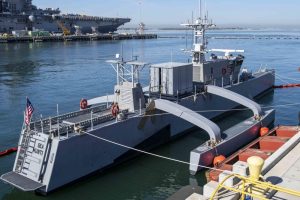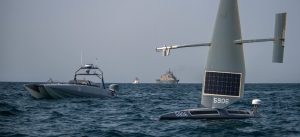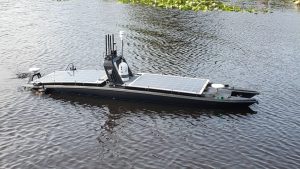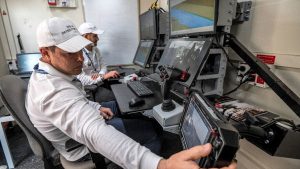Remotely patrolling the Persian Gulf
The Gulf Cooperation Council (GCC) member countries namely Kuwait, Saudi Arabia, Bahrain, United Arab Emirates, Qatar and Oman are creating and expanding a joint or multinational fleet of unmanned surface vessels (USV’s). The Persian Gulf through which the world’s major oil routes pass is 35 to 200 miles wide at places and it suits the US for proxy surveillance in order to implement its sanctions regime on Russian post Ukraine war and also on Iranian crude cargoes. The need for rapidly creating a fleet of around 100 USV’s was prompted after the US Navy seized large caches of weapons, ammunition and illegal drugs in the Gulf maritime region. The US Navy has integrated USV’s into its main fleet and patrols Central,South America ,Caribbean and Eastern Pacific waters to focus on counternarcotics maritime operations. The Iranian Navy had boarded an American Navy USV but smugglers lack state level resources to detect and interfere with American surface drones.
 Credit The Defense Post
Credit The Defense Post
Unmanned floating platforms are the future
The US Navy has launched a specialized division for bringing its medium and large unmanned vessels under a single command. The objective is primarily to bring innovation in the surface forces through experimentation and expansion of the fleet of USV’s which will be remotely managed like drones. Eventually the bridge of the vessels would be eliminated. The prospects of USV warfare seems unlimited and can replace conventional warfare to some extent.
 Credit Defense One
Credit Defense One
First maritime responder
This unmanned fleet will be the first responder to maritime threats and also gather data and local and satellite imagery will be beamed back to digital collection centers in the Gulf for threat analysis and appropriate response. These USV’s or crafts are equipped with technologically advanced sensors and imaging systems. The Naval Defence and Maritime Security Exhibition held last month at Abu Dhabi showcased the ability of these unmanned floating platforms to be deployed for purposes of surveillance, reconnaissance, anti-submarine warfare , anti-surface warfare missions and detecting mines .Modern warfare techniques have entered the Gulf waters and patrol units will be remotely controlled with virtually no chance of human casualties.
 Credit Naval News
Credit Naval News
UAE and Israel combine remote technology
 Credit Defense Review Asia
Credit Defense Review Asia
 Credit Al-Monitor
Credit Al-Monitor
The GCC countries are aligned and somewhat synchronized in their individual and collective efforts for acquisition or procurement as well as indigenous development of USV’s to contribute to the forward patrol units . UAE is partnering with Israel Aerospace Industries through its Emirati defence consortium known as EDGE and has jointly created an unmanned vessel.The GCC countries have vowed to reduce their external dependence on US and regional maritime forces and their first line of maritime defense and security is unmanned marine platforms accompanied by unmanned aerial crafts.The costs of maintaining large naval fleets will be slashed .Indigenization is also an integral component of these defense and security projects as highlighted in the Saudi Vision 2030. Enhanced surveillance extends across the entire area of sea operations to actually deter the flow of drugs into the Kingdom.
By Nadir Mumtaz

Leave A Comment